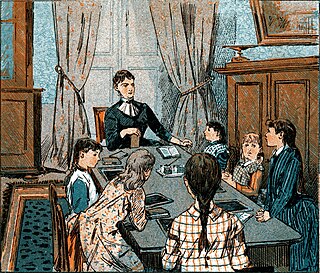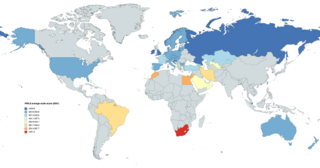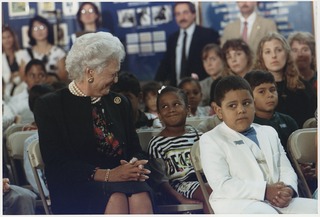School Reading List is a British online website covering children's books and children's magazines. [1] [2] [3] [4]
Launched in 2011, it includes age group lists for school classes, [5] [6] [7] children's and YA book reviews, 'books of the month', and resources. [8] The School Reading List website says its recommendations are "curated and reviewed by a small group of librarians, English teachers [9] and parents who discuss books that have worked well with groups of children". The company is based in London. [10] and operates a sister site, K-12readinglist.com in the USA. [6] [11]

Homeschooling or home schooling, also known as home education or elective home education (EHE), is the education of school-aged children at home or a variety of places other than a school. Usually conducted by a parent, tutor, or online teacher, many homeschool families use less formal, more personalized and individualized methods of learning that are not always found in schools. The actual practice of homeschooling varies considerably. The spectrum ranges from highly structured forms based on traditional school lessons to more open, free forms such as unschooling, which is a lesson- and curriculum-free implementation of homeschooling. Some families who initially attended a school go through a deschool phase to break away from school habits and prepare for homeschooling. While "homeschooling" is the term commonly used in North America, "home education" is primarily used in Europe and many Commonwealth countries. Homeschooling should not be confused with distance education, which generally refers to the arrangement where the student is educated by and conforms to the requirements of an online school, rather than being educated independently and unrestrictedly by their parents or by themselves.

Phonics is a method for teaching reading and writing to beginners. To use phonics is to teach the relationship between the sounds of the spoken language (phonemes), and the letters (graphemes) or groups of letters or syllables of the written language. Phonics is also known as the alphabetic principle or the alphabetic code. It can be used with any writing system that is alphabetic, such as that of English, Russian, and most other languages. Phonics is also sometimes used as part of the process of teaching Chinese people to read and write Chinese characters, which are not alphabetic, using pinyin, which is alphabetic.
Magic Tree House is an American children's series written by American author Mary Pope Osborne. The original American series was illustrated by Salvatore Murdocca until 2016, after which AG Ford took over. Other illustrators have been used for foreign-language editions.

Mary Pope Osborne is an American author of children's books and audiobook narrator. She is best known as the author of the Magic Tree House series, which as of 2017 sold more than 134 million copies worldwide. Both the series and Osborne have won awards, including for Osborne's charitable efforts at promoting children's literacy. One of four children, Osborne moved around in her childhood before attending the University of North Carolina. Following college, Osborne traveled before moving to New York City. She somewhat spontaneously began to write, and her first book was published in 1982. She went on to write a variety of other children's and young adult books before starting the Magic Tree House series in 1992. Osborne's sister Natalie Pope Boyce has written several compendium books to the Magic Tree House series, sometimes with Osborne's husband Will.

Scholastic Corporation is an American multinational publishing, education, and media company that publishes and distributes books, comics, and educational materials for schools, teachers, parents, children, and other educational institutions. Products are distributed via retail and online sales and through schools via reading clubs and book fairs. Clifford the Big Red Dog, a character created by Norman Bridwell in 1963, is the mascot of the company.
Readability is the ease with which a reader can understand a written text. The concept exists in both natural language and programming languages though in different forms. In natural language, the readability of text depends on its content and its presentation. In programming, things such as programmer comments, choice of loop structure, and choice of names can determine the ease with which humans can read computer program code.
The National Curriculum assessment usually refers to the statutory assessments carried out in primary schools in England, colloquially known as standard assessment tasks (SATs). The assessments are made up of a combination of testing and teacher assessment judgements and are used in all government-funded primary schools in England to assess the attainment of pupils against the programmes of study of the National Curriculum at the end of Key Stages 1 and 2 where all pupils are aged 6 to 7 and 10 to 11 respectively. Until 2008, assessments were also required at the end of Key Stage 3 (14-year-olds) in secondary schools after which they were scrapped.
BrainPop is a group of educational websites based in New York City. It hosts over 1,000 short animated movies for students in grades K–8, together with quizzes and related materials, covering the subjects of science, social studies, English, math, engineering and technology, health, arts and music. In 2022, Kirkbi A/S, the private investment and holding company that owns a controlling stake in Lego, acquired BrainPop.

Michael Wayne Rosen is a British children's author, poet, presenter, political columnist, broadcaster, activist, and academic, who is a professor of children's literature in the Department of Educational Studies at Goldsmiths, University of London. He has written over 200 books for children and adults. Select books include We're Going on a Bear Hunt (1989) and Sad Book (2004). He served as Children's Laureate from June 2007 to June 2009. He won the 2023 PEN Pinter Prize, awarded by English PEN, for his "fearless" body of work.

The IEA's Progress in International Reading Literacy Study (PIRLS) is an international study of reading (comprehension) achievement in 9-10 year olds. It has been conducted every five years since 2001 by the International Association for the Evaluation of Educational Achievement (IEA). It is designed to measure children's reading literacy achievement, to provide a baseline for future studies of trends in achievement, and to gather information about children's home and school experiences in learning to read.
Accelerated Reader (AR) is an educational program created by Renaissance Learning. It is designed to monitor and manage students' independent reading practice and comprehension in both English and Spanish. The program assesses students' performance through quizzes and tests based on the books they have read. As the students read and take quizzes, they are awarded points. AR monitors students' progress and establishes personalised reading goals according to their reading levels.

Gary David Schmidt is an American author of children's and young adults' fiction books. He currently resides in Alto, Michigan, where he is a professor of English at Calvin University.

Literacy in the United States was categorized by the National Center for Education Statistics into different literacy levels, with 92% of American adults having at least "Level 1" literacy in 2014. Nationally, over 20% of adult Americans have a literacy proficiency at or below Level 1. Adults in this range have difficulty using or understanding print materials. Those on the higher end of this category can perform simple tasks based on the information they read, but adults below Level 1 may only understand very basic vocabulary or be functionally illiterate. According to a 2020 report by Gallup based on data from the U.S. Department of Education, 54% of adults in the United States lack English literacy proficiency.

Reading is the process of taking in the sense or meaning of letters, symbols, etc., especially by sight or touch.

The National Assessment Program – Literacy and Numeracy (NAPLAN) is a series of tests focused on basic skills that are administered to Australian students in year 3, 5, 7 and 9. These standardised tests assess students' reading, writing, language and numeracy and are administered by the Australian Curriculum, Assessment and Reporting Authority (ACARA). The National Assessment Program is overseen by the Education Ministers Meeting.
The Common Core State Standards Initiative, also known as simply Common Core, was a multi-state educational initiative begun in 2010 with the goal of increasing consistency across state standards, or what K–12 students throughout the United States should know in English language arts and mathematics at the conclusion of each school grade. The initiative was sponsored by the National Governors Association and the Council of Chief State School Officers.

Common Sense Media (CSM) is an American nonprofit organization that reviews and provides ratings for media and technology with the goal of providing information on their suitability for children. It also funds research on the role of media in the lives of children and advocates publicly for child-friendly policies and laws regarding media.

ABCmouse.com Early Learning Academy is a digital education program for children ages 2–8, created by the edtech company Age of Learning, Inc. The program offers educational games, videos, puzzles, printables, and a library of regular and “read-aloud” children’s books, covering subjects including reading and language arts, math, science, health, social studies, music, and art.

Twinkl is an online educational publishing house founded in 2010 and headquartered in Sheffield, England, producing teaching and educational materials. Twinkl was founded by Jonathan Seaton and Susie Seaton. They also produce resources based on movies.

Keith James Topping is a researcher in education. He designs intervention programs for teachers, parents and others to help children, then researches whether and how they work.